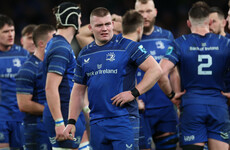LEINSTER ARE CELTIC League champions.
They field a team crammed with Ireland internationals, who come back to provincial duty after a disappointing September-October on the Test front.
A remarkable winning streak progresses steadily through Halloween, November, Christmas and New Year leaving the eastern province with qualification for the European Cup quarter-finals sealed early.
So far, so familiar.
Yet this case is from the 2001/2 season, And, for the time-being at least, that vintage of Leinster team still hold the province’s single-season record for consecutive wins. A mark of 15 on the trot, which the current crop can match against Lyon in the RDS tomorrow.
Though there are several skin-deep similarities in the winning streaks separated by 18 years you barely need to scratch the surface to reveal a world of difference between then and now.
For starters there was the structure of the season itself. The inaugural Celtic League played off the majority of fixtures in the first half of the period we would recognise as the season.
After sweeping through their eight-team conference Matt Williams’ side then claimed the title by beating Munster in Lansdowne Road. A trophy in the bag and still a week out from Christmas, it was a heady mix of distractions for a squad with roots planted in the amateur era.
“We were tired. Our season was over about three weeks before,” says scrum-half of the day Brian O’Meara as he looks back the first loss of that season, away to Toulouse.
“Our diet was poor. In terms of recovery and rest, we were way off the pace.
We did loads of on-field training, we didn’t rotate our squad and we drank way too much after beating Munster in the Celtic League final.”
And so, what on paper looked like a three-week break to recuperate and ramp up to two last pool matches, turned into a license to indulge in Championship celebration and festive excess.
The January hangover left them cold. England’s north-east is never the place to seek out warmth or a soft landing.
“The game was set for Saturday and it was called off due to a frozen pitch. We flew home the Sunday and the match was transferred to Leeds.”
A short turnaround at home then, back on the plane, back across the channel and this time to Headingly. With Nathan Spooner on the injured list for the final two rounds of the Heineken Cup pool, O’Meara slipped on the number 10 shirt for a rearranged Tuesday night meeting with the Falcons.
They scraped win number 15 of the season, 15-17. Yet the sweet winning rhythm was fast becoming just a memory, wheels were already wobbling their way from the axle. A Tuesday night win in the English midlands meant a five-day turnaround to a Sunday scuffle in Toulouse.
It would be Brian O’Driscoll’s turn to play at number 10 with Leinster setting out a stall, successfully keeping the game nice and tight to reach half time with the hosts just 3-0 in front.
Before all that, though, the playing group had taken up another opportunity to let their bleached hair down. Given an inch, they livened up a bleak January no end thanks to southern French delights.
“The coaches said to us go out and have a beer in Toulouse. Sure half the lads got a sniff of that so they went on the piss!
“We were shattered.
“At half time I remember coaches saying, ‘We’re not playing, start opening up’. And once we did that we were lambs to the slaughter.”
3-0 through the first 40 minutes became 40-7 by full time. The wheels were all the way off, the winning run felled by the 16th hurdle and only a Heineken Cup quarter-final away in Leicester to look forward to beyond the Six Nations.
“Our season was over in January,” muses the Corkman. “We played one more match away to Leicester in the quarter-final and then we had two matches left – Munster in April, Connacht in May – and that was the season over.
“So most of the players, after we lost to Leicester, were back playing for their club. For the last few months I was up and down the road, training three days in Leinster and then back to play for Cork Con. By the end of the season, we were exhausted.”
With the majority of the season front-loaded into a taxing fixture list from August to December, O’Meara’s stand-out memories naturally come when the vein of form was at its richest.
Another Tuesday night fixture, at home to Pontypridd was memorable for any reason other than rugby.
“I’ve some very vague recollections of some of the matches. I remember Ponty pretty well, because it was 9/11.
“My sister was in New York at the time so I’d been up all morning going ‘Jesus, is she alright…’”
Fortunately, the scrum-half’s most immediate concerns were allayed well before kick-off. But the sight of the Twin Towers’ destruction resonated everywhere.
“(My sister) was well away from that area. I’d been texting her during the morning asking if she was okay. There weren’t many texts coming through, but she text after lunch then that it was all fine.
“Back in those days we had someone in to present jerseys before every league match. Ollie Campbell was in before Ponty. Sure no one can remember what he said, I’d say. 9/11 and the scenes from the TV were still in our minds.
“There was a very small crowd… there was a very weird vibe around the place. My only memory of the match is that Denis Hickie scored a try from about 90 yards.”
Hickie was usually one of the most eye-catching of the exceptional back-line that thrived behind a maturing pack led by Leo Cullen, Reggie Corrigan, Shane Byrne and Victor Costello. O’Meara quickly realised he need only strip his game down to core elements, becoming the conduit in between to get the best out of his adopted province.
“We played some great rugby. I was basically passing the ball to some of the best backs in Irish history. Give them as good a service as possible. It was just a joy to watch.
O’Driscoll, Darcy, Horgan Hickie, Dempsey – ah it was a privilege to play with them for three or four years. I was like a bystander in awe at some stages.
“When I was younger I was a lot more lively, breaking and just trying to be a nuisance scrum-half. But Matt Williams was just: ‘Your job is to get there and serve them as fast as possible!’.
“If I tried to break and wasn’t there at the next ruck he’d give out to me.
“We played some great rugby and the team was very settled, but that was an issue going forward.”
***
Now 43 and a teacher in Dublin’s St Michael’s College, O’Meara vividly recalls an early peak, game eight of the 15-game, five-month winning run.
The close confines of Donnybrook packed to the rafters to create a ‘magical’ atmosphere as Toulouse were trounced 40-10.
Champagne rugby on the surface while all below was a simmering state.
“The after-match function was in Old Belvedere Rugby Club. We’d all played Toulouse before, the reception you got after the match there was like a five-star hotel. We brought them to Belvedere on this dark, dreary wet night and they were served this manky Irish stew.
“They must have been disgusted.”
It wasn’t just the opposition. And it wasn’t about the food.
***
In contrast to the 50-odd players Leinster now routinely churn through in a given season, squad rotation was a science in its infancy in 2001. Forget the notion of a carefully-plotted player management directive from the top down.
O’Meara played in all 15 matches of the winning run. And though it may sound counter-intuitive, that personal run could easily have been cut short had he felt supported by a more progressive and rounded squad culture.
During the home victory over Toulouse in Donnybrook – a match that came a week after Ireland’s ill-fated rescheduled September Six Nations against Scotland, the Foot and Mouth game – O’Meara tore a bicep tendon and felt the need to soldier on.
Looking back, the Corkman says knock-on effects served to weaken his shoulder long-term.
Now, he laments it as ‘probably the beginning of the end’. Then, there was no time to countenance holding himself back for the sake of greater longevity. He would cling on with grim intent to his starter’s jersey feeling that there could be no way back to the starting XV if he were to drop out.
“Nowadays you’d be straight for surgery. It was a dog-eat-dog world,” says O’Meara.
While a team keeps winning it can maintain the veneer of happy families. Seeds of discontent sewn during the streak would sprout over the next campaign.
“It probably only surfaced the following year. But a lot of them need to look at themselves too, they formed this ‘Blue Core’ of players who weren’t really involved in the squad as much. All they did was go out of a Wednesday night and give out about everyone else!”
O’Meara won nine international caps for Ireland over seven years and was very much on the fringe when the Test groups gathered. So he has sympathy for the splinter group. Little wonder they would label themselves as a separate entity when the team-sheets continually revealed them to be a group apart.
I’d have been in and out of the Ireland squad – probably more out than in – and when the Irish players were away we were trained like dogs.
“Fitness, dull drills, you could see the coaches not having the same desire or passion. There was no matches often times, so a lot of the fringe players were treated poorly, you were on poorer money… when the internationals came back training would intensify, there’d be better drills, better preparation.
“So a lot of the fringe players were just like: ‘This is pretty shite’. Naturally enough they became a bit disenfranchised.”
Whether it was the adrenaline sprung from playing through the pain in his bicep or just the feeling that the front-line Leinster players were putting something special together, O’Meara counts that period when all hands were to the pump in Celtic League knockout phase as a cherished memory. It helped that the fixture list added the spice of familiarity through three straight matches against a strong Newport side between Heineken Cup back-to-backs and a Celtic League quarter-final.
“They were a bloody good team. We beat them away from home (in Heineken Cup round four) and I remember the floodlights went.
“We were being hammered, went in to the dressing room for 30-40 minutes but the break suited us really well.
“Our coaches had kept doing a drill with us where on a two-man tackle one will try to rip the ball. It probably only worked this once, Peter McKenna ripped the ball and ran 90 yards to score at the opposite end of the field – that was the try that won us the game.”
Though all trips to Wales ended in victory that season, not all had such welcome intervals. In Bridgend, head coach Williams managed to foreshadow Phil Brown’s infamous Hull City half-time on-field team-talk.
“We played Bridgend away and the coach was furious at us and kept us out at half-time doing defensive drill. We were on the way to the dressing room, Matt Williams ran up, absolutely furious. ‘Lads, we’re staying out’. Took out a few cones and we started practicing pillar defence.
“All the locals were laughing at us.”
“We were mortified, but we had been a bit casual in the defensive stuff.”
The mortification and murmurs of discontent have long since faded of course.
Eighteen years on, O’Meara has played a part in shaping many of the men involved in the current Leinster streak through his work in the class and on grass at St Michael’s. From Ross Byrne, Max Deegan, Rory O’Loughlin to Cian Kelleher, all involved with the Leinster squad – amid winning streak or otherwise – continually espouse the value of competition for places, a ‘brothers’ mentality through the whole squad and a sense that every senior veteran must continually prove his value to retain a position.
The similarities between this season’s streak and 01/02 are greatly outweighed by the differences. January certainly doesn’t feel like the end for the Leo Cullen-coached side.
“They’ll definitely beat it,” O’Meara says of the standing record without the need for any deliberation.
“They mightn’t stop, that’s the thing about them.”
The42 is on Instagram! Tap the button below on your phone to follow us!















Some man for 1 man.
Great that he tries it. Shame other players come in for massive flack for waaay less riskier situations, great defensive tackle from Hansen too, keeps him in starting position this weekend.
reat that he tries it. Shame other players come in for massive flack for waaay less riskier situations, great defensive tackle from Hansen too, keeps him in starting position this weekend.